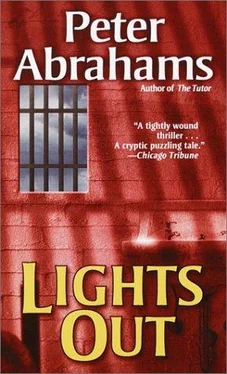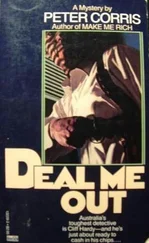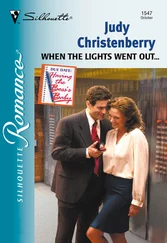Peter Abrahams - Lights Out
Здесь есть возможность читать онлайн «Peter Abrahams - Lights Out» весь текст электронной книги совершенно бесплатно (целиком полную версию без сокращений). В некоторых случаях можно слушать аудио, скачать через торрент в формате fb2 и присутствует краткое содержание. Год выпуска: 2002, ISBN: 2002, Издательство: Fawcett Books, Жанр: Триллер, на английском языке. Описание произведения, (предисловие) а так же отзывы посетителей доступны на портале библиотеки ЛибКат.
- Название:Lights Out
- Автор:
- Издательство:Fawcett Books
- Жанр:
- Год:2002
- ISBN:978-0345445780
- Рейтинг книги:4 / 5. Голосов: 1
-
Избранное:Добавить в избранное
- Отзывы:
-
Ваша оценка:
- 80
- 1
- 2
- 3
- 4
- 5
Lights Out: краткое содержание, описание и аннотация
Предлагаем к чтению аннотацию, описание, краткое содержание или предисловие (зависит от того, что написал сам автор книги «Lights Out»). Если вы не нашли необходимую информацию о книге — напишите в комментариях, мы постараемся отыскать её.
Lights Out — читать онлайн бесплатно полную книгу (весь текст) целиком
Ниже представлен текст книги, разбитый по страницам. Система сохранения места последней прочитанной страницы, позволяет с удобством читать онлайн бесплатно книгу «Lights Out», без необходимости каждый раз заново искать на чём Вы остановились. Поставьте закладку, и сможете в любой момент перейти на страницу, на которой закончили чтение.
Интервал:
Закладка:
“I’m going to disappoint you this time,” Eddie said.
“In what way?”
“If you’ve come to pump me about my brother.”
Karen took off her sunglasses. There were shadows under her eyes and her face was pale. “We’re just like an old couple,” she said, “picking up the conversation in mid-fight.”
A breeze stirred in the trees, clearing away the dust, blueing the sky. Karen looked up at the hippie house. “Why don’t we just go up and talk to him?”
“He’s not there.”
Her eyes went to Eddie, and then to the backpack. “Aren’t you the loyal little brother.”
There was no reason to be loyal, now that he knew what Jack had done. Still, Eddie replied: “You’re a cop.”
“Not exactly,” Karen said. “And he’s no longer the subject of an investigation.”
“Why is that?” Was it simply the returning of the $230,000, or did she know Jack was dead? Had his body been found and identified? Eddie couldn’t think of any reason why Senor Paz would let that happen.
“Lack of evidence,” Karen replied.
“And you’ve come to dig up more.”
“I told you-the investigation is over.”
“Then why are you here?”
“I just want to talk to him.”
“About what?”
Karen didn’t answer right away. Her eyes weren’t quite the same now. Same shade of blue, of course, but because of her fatigue, or the heat, or something else, not as cool as before.
“You,” she said.
“You’re investigating me?”
“In a sense.”
“Meaning what?”
“In the broadest sense. I’m interested in you. In what happened to you.”
“For your thesis?”
“If you like.” Karen put her sunglasses back on. “I’ve read the transcript of your trial. You denied knowing the marijuana was on board. I found myself inclined to believe you.”
“That’s nice.”
There was a long pause. Then Karen said: “They executed Willie Boggs last night.” She waited for Eddie to speak. He watched his close-mouthed reflection in her sunglasses and said nothing. “Some odd things happened,” Karen went on. “First I spoke to a man named Messer. He seemed very curious to know your whereabouts. Not long after that, not long after Willie died, in fact, Messer died too. Bullet in the head. I found him in the ambulance that should have been carrying Willie. Willie’s body bag was empty. They counted the inmates. One was missing. Can you guess who?”
“No.” But he could.
“Angel Cruz. The one they call El Rojo. Did you know him?”
“We’d met.”
“And?”
“And what? Are you suggesting I helped him escape?”
“No. I’m just wondering if you can explain what happened.”
“Why would I be able to do that?” Eddie said, and Karen didn’t answer. But he could explain it, all right. He understood everything: how El Rojo must have gotten to Messer, how, fearing surveillance, he had tried to set up the payoff rendezvous using the hundred-dollar bill, how Eddie had interfered with the plan, first by not giving the bill to Sookray in the Dunkin’ Donuts lot, later by handing her the wrong one. El Rojo had found another method, proving his resourcefulness and Messer’s naivete. He’d be in Colombia by now, lying low on one of his ranches.
“Come up with it yet?” said Karen.
Eddie saw that her face had paled more, wondered if she was running a fever. “What does your friend with the gun think?”
“Forget him. Max errs on the side of error.” The angle of her sunglasses dipped, as though she was looking him over. “Your appearance made him cautious.”
Caution; not a bad idea. Eddie moved closer to the car, checked inside, saw no one lying on the backseat or crouched on the floor.
“Want me to open the trunk?” Karen said.
Eddie shook his head.
Tiny beads of sweat appeared on her upper lip. She brushed them off with the back of her hand. “You won’t mind if I see for myself,” she said.
“See what?”
“If Jack’s up there.” She got in the car, waited for Eddie to join her. When he did not, she turned the key and drove up the lane. Eddie stood for a minute or two by the side of the road. Then he mounted JFK’s bike and followed.
The lane rose steeply up the bluff, so steeply that Eddie had to get off and walk the bike most of the way. He rounded a bend, passed another tree bearing the small yellow-green fruit, and came to her car, parked beside the house. From there, at the top of the bluff, he could see to the horizon where an invisible line segregated sky-blue from sea-blue. Closer in, perhaps a mile offshore, waves broke over the reef. Not far beyond them the long white cruiser he had seen at Galleon Beach glided south.
There was no sign of Karen. Eddie walked to the screen door at the side of the house. Near the handle the screen was bent back from the frame, leaving a fist-sized hole. Eddie opened the door and went in.
Kitchen. Discolored rectangles imprinted on the linoleum marked the spots where the appliances had rested. Nothing remained but a wine bottle with a candle in it, upright on the floor, and a simple wooden table, painted yellow. An enormous toad squatted on it like a centerpiece in a restaurant destined to fail. For a moment Eddie wasn’t sure whether it was alive. Then its long tongue flicked out and caught an ant crawling across the table.
Eddie went through the kitchen to the living room, the toad’s eyes following him the whole way. The living room had a fraying sisal carpet on the floor but no furniture. A screened porch with a rusted kettle barbecue and another endless view ran the length of the room. The long white cruiser had moved farther south. As Eddie watched, it turned out to sea, away from the reef, circled, and started coming back.
At the far end of the room was a narrow staircase. Eddie went up. There were words on the wall, painted in faded rainbow colors:
Whoever loved that loved not at first sight?
The stairs led to the single room on the top floor. A bedroom, with bed still in place. Too hard to move: an ancient and massive four-poster, probably shipped from Europe generations ago, carved with roses and hung with mosquito netting. What the bed might have implied the walls and ceiling clearly stated. Every inch of whitewashed space was covered with rainbow-painted inscriptions:
Forever wilt thou love, and she be fair!
And this maiden she lived with no other thought Than to love and be loved by me.
’Tis better to have loved and lost Than never to have loved at all.
I wonder by my troth, what thou, and I Did, till we lov’d? were we not wean’d till then? But suck’d on country pleasures, childishly? Or snorted in the seven sleepers’ den?
They do not love that do not show their love.
Is it, in Heav’n, a crime to love too well? To bear too tender or too firm a heart, To act a lover’s or a Roman’s part? Is there no bright reversion in the sky For those who greatly think, or bravely die?
Western wind, when wilt thou blow? The small rain down can rain, — Christ, if my love were in my arms And I in my bed again!
Cross that rules the Southern Sky! Stars that sweep, and turn, and fly, Hear the Lovers’ Litany:-“Love like ours can never die!”
That out of sight is out of mind Is true of most we leave behind; It is not sure, nor can be true, My own and only love, of you.
And dozens, perhaps hundreds more, crowding out any blank space. Karen stood with her back to him, head tilted to read the one about out of sight and out of mind, written on the ceiling.
“Arthur Hugh Clough,” she said without turning: “the Leo Buscaglia of Romantic poetry.”
“Never heard of him,” Eddie said. “Either of them.”
“You’re not missing anything.” She faced him. “Coleridge is your man, isn’t he? Or have you chucked him?”
Читать дальшеИнтервал:
Закладка:
Похожие книги на «Lights Out»
Представляем Вашему вниманию похожие книги на «Lights Out» списком для выбора. Мы отобрали схожую по названию и смыслу литературу в надежде предоставить читателям больше вариантов отыскать новые, интересные, ещё непрочитанные произведения.
Обсуждение, отзывы о книге «Lights Out» и просто собственные мнения читателей. Оставьте ваши комментарии, напишите, что Вы думаете о произведении, его смысле или главных героях. Укажите что конкретно понравилось, а что нет, и почему Вы так считаете.












